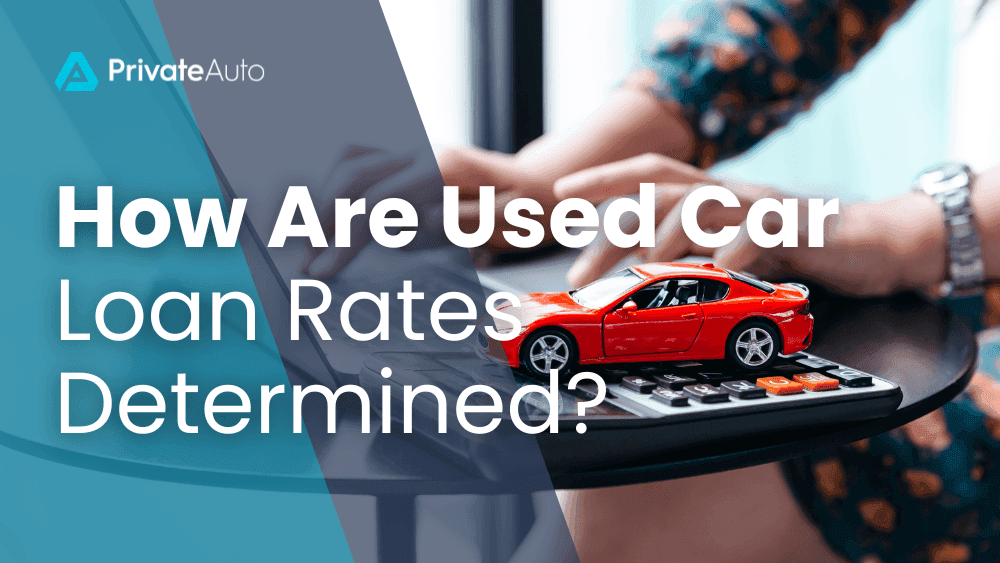How Are Used Car Loan Rates Determined?
Borrowing History
When you begin applying for a used car loan, you'll likely receive instant decisions on your application. That's because most lenders use an automated system to determine whether they'll consider your application. By far, one of the biggest components that determines whether you are approved or denied is your borrowing history, which is partially represented by your credit score.
When lenders consider your application for a loan, they will refer to your credit score and credit file. Those with a "thin" file (i.e., new borrowers who have never or rarely taken out loans) will find it almost as hard to get approved as someone with bad credit. Ultimately, lenders want to see a borrower who has a solid history of paying back the money they take.
If you have limited borrowing history or you have defaulted loans, a bankruptcy, missed payments, or other negative items in your credit file (especially from the last two years), you'll find it difficult to qualify for most car loans. When you do get an approval, your interest rate will be substantially higher to help the lender make up for the risk.
To summarize:
If you have a poor borrowing history or lack borrowing history altogether, work on improving your credit score before applying for a used car loan. It will increase your odds of approval and help you score a better interest rate, which could save you thousands over the life of the loan.
When lenders consider your application for a loan, they will refer to your credit score and credit file. Those with a "thin" file (i.e., new borrowers who have never or rarely taken out loans) will find it almost as hard to get approved as someone with bad credit. Ultimately, lenders want to see a borrower who has a solid history of paying back the money they take.
If you have limited borrowing history or you have defaulted loans, a bankruptcy, missed payments, or other negative items in your credit file (especially from the last two years), you'll find it difficult to qualify for most car loans. When you do get an approval, your interest rate will be substantially higher to help the lender make up for the risk.
To summarize:
•
The lower your credit score, the more risk you represent.
•
The thinner your credit file, the more risk you represent.
•
The worse your borrowing history, the more risk you represent.
•
The more risk you represent, the higher your interest rate.
Current Income and Debt
Even if you have an excellent credit score and thick file filled with years of on-time payments, lenders like to know that you have some "skin in the game" when you borrow money from them. As such, your down payment amount will certainly factor into your approval odds. However, to further offset the lender's risk, they also consider your income and debt.
Your income and debt can actually be summarized with the debt-to-income (DTI) ratio. Most lenders will not give you money if your DTI exceeds 43% to 55%, which is at the very top end of what is considered acceptable. A ratio of 55% means your monthly debt (i.e., be it other loan payments, rent, etc.) takes up 55% of your monthly income.
Going back to what you just learned: higher risk equates to higher interest. So, if you have a high DTI ratio and/or a small down payment amount (or none at all), you're likely going to get a higher interest rate on your used car loan. Reducing your monthly debts, increasing your income, or saving up a larger down payment can help you mitigate these challenges.
Your income and debt can actually be summarized with the debt-to-income (DTI) ratio. Most lenders will not give you money if your DTI exceeds 43% to 55%, which is at the very top end of what is considered acceptable. A ratio of 55% means your monthly debt (i.e., be it other loan payments, rent, etc.) takes up 55% of your monthly income.
Going back to what you just learned: higher risk equates to higher interest. So, if you have a high DTI ratio and/or a small down payment amount (or none at all), you're likely going to get a higher interest rate on your used car loan. Reducing your monthly debts, increasing your income, or saving up a larger down payment can help you mitigate these challenges.
Length of The Loan
Now that you understand how your credit history and debt/income situation impacts your used car loan rates, it's important to recognize that these factors do not determine your rates all of their own. Another aspect that will factor into your interest rate is the term length you choose, or how many months you ask the lender to give you to pay back your car loan.
The average term for a car loan is now around 69 months. Most lenders offer terms like 24 months, 36 months, 48 months, 60 months, and 72 months. You may also have the option to opt for 84 months. However, most lenders will show you side-by-side how the interest rate increases as you consider longer repayment terms.
It's important to understand the exponentially increasing rate you're going to pay when you opt for a longer-term so that you can make an informed decision. At first glance, an increase of just 0.5% from 60 months to 72 months may not seem like a big deal, but you have to realize you're increasing both the amount you pay in interest each month and the number of monthly payments you plan to make.
This gives interest more time to accumulate, now at an increased rate, and it will cost you significantly more in the long run. Of course, there are instances where you may need to choose a longer-term to make the monthly payment work for your budget. What matters is that you consider all of your options.
The average term for a car loan is now around 69 months. Most lenders offer terms like 24 months, 36 months, 48 months, 60 months, and 72 months. You may also have the option to opt for 84 months. However, most lenders will show you side-by-side how the interest rate increases as you consider longer repayment terms.
It's important to understand the exponentially increasing rate you're going to pay when you opt for a longer-term so that you can make an informed decision. At first glance, an increase of just 0.5% from 60 months to 72 months may not seem like a big deal, but you have to realize you're increasing both the amount you pay in interest each month and the number of monthly payments you plan to make.
This gives interest more time to accumulate, now at an increased rate, and it will cost you significantly more in the long run. Of course, there are instances where you may need to choose a longer-term to make the monthly payment work for your budget. What matters is that you consider all of your options.
Find The Right Car for Your Lifestyle
Whether you're financing your used car purchase with a small down payment, no down payment, or using funds that have been gifted to you, the most important thing is that you spend your money wisely. You want to get behind the wheel of a car that will make you feel safe and confident every time you drive it, and PrivateAuto can help.
With a secure system that helps you find vehicles, make offers, and communicate with sellers online, PrivateAuto makes buying a car in the modern era simple. Start your car search today.
With a secure system that helps you find vehicles, make offers, and communicate with sellers online, PrivateAuto makes buying a car in the modern era simple. Start your car search today.



